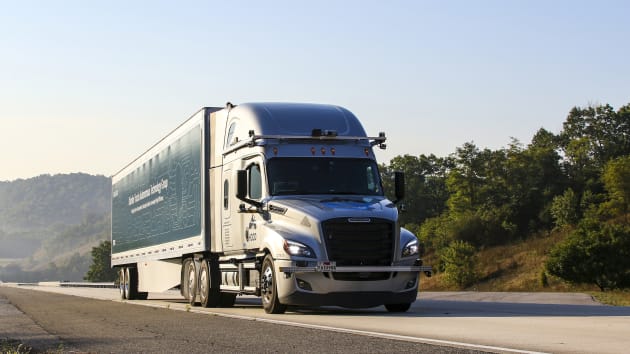Earlier this month, Silicon Valley startup Plus.ai was the first company ever to have a self-driving truck make a coast-to-coast commercial freight trip. The autonomous truck, along with a supervising driver and mechanic, drove for three days from Tulare, California to Quakertown with over 40,000 pounds of butter in tow.
While Plus.ai’s cross country butter trip was historic, it was hardly the first time an autonomous truck traveled on American roads. Many times throughout the past two years, self-driving truck technology companies have been testing smaller scale routes with autonomous trucks.
San Francisco-based company Embark Trucks had a self-driving truck complete a 2,400 mile cross-country trip within five days back in 2018, although the truck carried no freight. Daimler Trucks, in conjunction with Torc Robotics’ technology, tested autonomous trucks on public roads in southwest Virginia as recently as September.
While the technology itself is a feat, it proves much more than showing we have the ability to create an autonomous vehicle: it shows autonomous vehicles are the future and large changes related to safety, jobs, legislation, and money are coming to the commercial trucking industry.
Safety Will Be Enhanced
According to an analysis of fatal truck accident statistics, from 2015 to 2017, large trucks were involved in nearly 11,000 fatal crashes in American, killing 12,230 people. With distracted driving on the rise, autonomous vehicles could be the solution to making roads safer for everyone.
Many vehicles have autonomous technology that include systems for collision avoidance, stability control, and lane departure warnings. Coupled with an attentive truck driver, this technology could help reduce the number of fatal truck collisions, saving lives and improving efficiency long-term.
A Shift in Trucking Jobs
The shift to autonomous trucks in the industry is coming sooner rather than later, and could mean a shift in job responsibilities for truckers.
The Los Angeles Times predicted an elimination of nearly 2 million jobs within the next decade should self-driving trucks be truly autonomous. Conversely, the American Trucking Association estimated it could be more than 20 to 25 years before fully autonomous trucks are the norm.
Some suggest instead of operating a truck, a person may shift into a supervisor-like role, taking control of the wheel when road construction or bad weather affects routes. Others believe that there will actually be an increase in jobs, as teleoperation controllers will be required to control semi-trucks during certain parts of their journey.
Since nearly 70% of all freight is transported by truck, accounting for nearly $672 billion worth of manufactured and retail goods transported by truck every year, it will take time for autonomous vehicles to penetrate the market. By that time, ideally the shift in the truck driving job market will coincide.
New Laws and Legislation
The safety and welfare of the American people is the utmost concern for legislators. Just like the Federal Motor Carrier Safety Administration has regulations to keep truck drivers safe on the road, new laws and regulations will need to be put in place to ensure autonomous trucks do the same.
The House of Representatives passed a bill in September of 2017 that lifts many restrictions on self-driving vehicles on American highways, although autonomous trucks were dropped from the bill. It will take time as proposed legislation works out the specifics of design, construction, software, and human responsibility in relation to autonomous commercial trucks on American roadways.
Boom in Funding
Daimler, Waymo, Plus.ai, Tesla, Embark, and TuSimple are the leaders in the self-driving truck industry, with many receiving added financing and partnering with delivery and supply chain management companies, such as UPS.
Most recently, TuSimple received an additional $95 million in funding, for a total of $178 million, while new startup company Ike just raised over $52 million. Companies are racing to grab market share, ideally creating the best, most efficient product possible. Tesla, as well as Thor Trucks, have confirmed electric trucks are well on their way, which would reduce fuel costs and limit negative environmental impacts.
When is Change Coming to the Trucking Industry?
While the timeline of autonomous trucks on American roadways has yet to be defined, legislation is most likely the biggest factor in allowing self-driving trucks to hit the road.
Once autonomous trucks are fully rolled out, there will be large changes to safety, jobs, and money in the commercial trucking industry. Various factors will determine whether or not these changes are deemed “bad” or “good”, but ultimately, self-driving truck technology should empower everyone involved in the truck industry to drive safer and more efficiently.



































